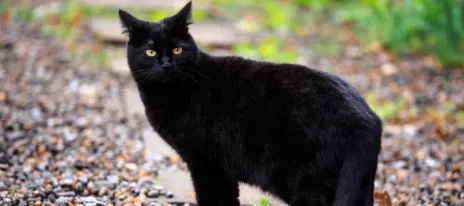
What does it mean to meet a black cat?
Cats, in general, are seen as mysterious and lovely creatures. Many people find them to be wonderful companions, and in some cultures, they have even been highly respected. While most people can appreciate their charm, there was a time when cats, especially those with black fur, were thought to be more than just pets.
The negative ideas surrounding black cats come from the old belief that they were linked to witchcraft and bad fortune. It was once thought that “if a black cat crossed your path, something bad would happen.” Because of this belief, some people would even “wait for the cat to return along the same path to be able to cross safely.”
These ideas are mostly old stories that have been told about black cats for many years. This has led to them being unfairly labeled in a negative way, and this label still sticks with them today.
Sadly, when people are looking to adopt a cat, those with dark fur often have a harder time finding a home. It’s been observed that “the adoption rates of black cats are lower than those of others with lighter tones,” and this might be because these old superstitions are still around in our culture.
What does it mean when a black cat comes into your house?
If a black cat happens to come into your home, there could be many simple explanations, and not all of them have to do with old superstitions. It might just be a little kitten looking for something to eat, and “it doesn’t necessarily indicate that someone has performed black magic on you.”
However, in some of the oldest traditions, “a black cat is a symbol of the night and often represents the feminine condition (not necessarily witches).”
But overall, “black cats bring good luck wherever they go and are animals capable of transmuting negative energies into positive ones.”

The reason a black cat comes into your life
It’s often said that “a cat comes into your life to bring you life lessons, patience, and care.” We should also remember that “the cat symbolized the values of freedom, independence, and autonomy due to its lack of submission to humans.”
Going back in history, “the ancient Egyptians were the first to attribute to cats (especially black ones) the role of good luck.” They noticed that “families with cats in the home had more food, contracted fewer diseases, and suffered fewer deaths than families without cats.”
“The Egyptians placed great importance on the cat’s careful grooming,” and their skill in “kill[ing] mice, rats, scorpions, and snakes was considered a true stroke of luck.” Another benefit of having cats was that “they did not eat grains, which, incidentally, was the almost exclusive diet of the Egyptians.”




